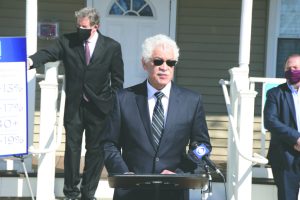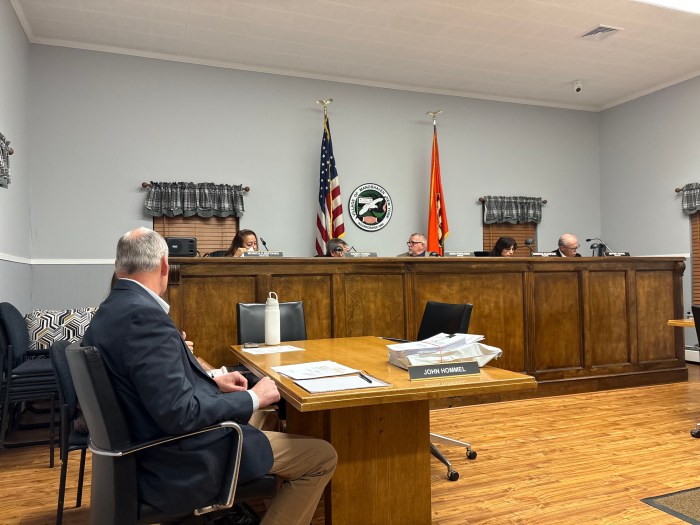
On Feb. 25, Dr. Joseph Smith, licensed psychologist and executive director of Long Island Reach, along with several mental health professionals held a press conference at the Port Counseling Center in Port Washington asking New York State for additional funding and resources for mental health and addiction services on Long Island.
“Without more funding and support, lives will be lost and suffering will continue,” Smith said. “Elected officials need to act now to provide funding.”
According to Long Island Reach, a community-based nonprofit which provides comprehensive social, psychological, educational and legal assistance, the need for mental health services has increased dramatically since the pandemic began last year. Mental health agencies across Long Island are seeing growing numbers of people at risk of suicide, depression, alcohol and substance abuse, opioid addition and overdoses as a result of the ongoing pandemic.
Since the pandemic began, Long Island Reach has conducted more than 21,000 Telehealth mental health visits. But the increased demand in services has put a strain on mental health agencies, many of whom had their state and federal funding cut. After causing significant turmoil, state funding cuts were restored, but more funding is needed to meet the high demand. With the lack of funding, mental health agencies on Long Island are facing massive challenges in their ability to serve the rapidly increasing numbers of individuals and families in crisis.
During the press conference, several mental health professionals spoke about the importance of funding programs and services via state and federal aid.
“We are here to express our outrage at the actions of New York State threatening drastic reductions in funding,” Smith said. “At this moment we are in the midst of not one but three public health crises. COVID-19 has ravaged our region and brought enormous pain and suffering to countless households.”

Smith stated that overdoses have risen 17 percent in 2020 and the number of mental health disorders have also increased, leading to increased rates of suicide.
“This is the worst possible time to even consider reductions in funding, which would translate to reductions in services for those seeking help,” Smith said. “There are indications that the threat of drastic cuts to community-based service programs appears to have been reversed, however, we cannot and will not stop our coordinated efforts to ensure that the communities have the resources to meet the challenges that these three crises bring.”
Anthony Rizzuto of The Seafield Center, a drug and alcohol addiction rehab center, spoke about the increased rate of substance abuse and fatal overdoses on Long Island in the past year.
“People are showing up sicker and sicker and in need of help,” Rizzuto said. “This is alarming. Our feeling is that there will be a tsunami of need for services going forward. We cannot have the doors closed when people show up for help. I understand that there are hard times and that there are shortfalls. [But] I encourage our elected officials, I encourage our governor to make this a priority.”
Sharon Richmond, of Northport, who tragically lost her son, Vincent, to drug addiction a few years ago, spoke at the press conference detailing the importance for families to be able to receive the care they need.
“I stand with over 81,000 other parents who grieve the loss of their children to overdose, another 88,000 to alcohol-related deaths and 47,000 suicides this past year,” Richmond said. “I hope by sharing my son’s story, I can create a future where those who battle the disease of addition and mental illness can have the same basic human right to healthcare as those who have a regular medical condition. A future where there is never a question about cutting funding for mental health or substance use disorders when the need now is greater than ever.”
Richmond stated that her son tried to self-detox several times, but was unsuccessful. When he finally decided to seek help, Vincent was denied by the insurance company four times in one year.
“The insurance company stated he didn’t fit medical necessity,” Richmond said. “First he had supportive parents, second he was motivated to get better. By the third denial I filed a complaint with the attorney general’s office. They were able to get my son 14 days. Fourteen days is such a short time for someone to physically and mentally overcome addition.”
Although Vincent was able to temporarily stay clean, he ultimately relapsed because he lacked the mental health resources he so desperately needed. Vincent was denied long-term care by his insurance company and shortly after that he unknowingly bought drugs laced with fentanyl, causing him to overdose.
“Vincent’s battle was like too many others,” Richmond said. “In his honor and for those still facing barriers I advocate for change. No one should every have to fight so hard for the basic rights to healthcare. When I advocate, I am not looking for sympathy and I’m not looking for sympathy or words from our representatives, as words can’t bring back my son or help those families who are in crisis right now.”
Richmond hopes that by sharing her son’s story she will be able to raise awareness about the need for increased funding for the prevention, treatment, services and the basic right to healthcare.
Theresa Buhse of The Long Island Crisis Center, Claudia Boyle and Cindy Wolf of Nassau Alliance for Addiction Services along with several other mental health professionals from all across Long Island also attended the press conference to help demand more funding for mental health services from NYS.
Long Island Reach has created a sample letter for those who are interested in writing to their local elected officials. For more information about Long Island Reach or to view the sample letter of support, visit longislandreach.org/help-save-programs.
—Additional information provided by Long Island Reach





























